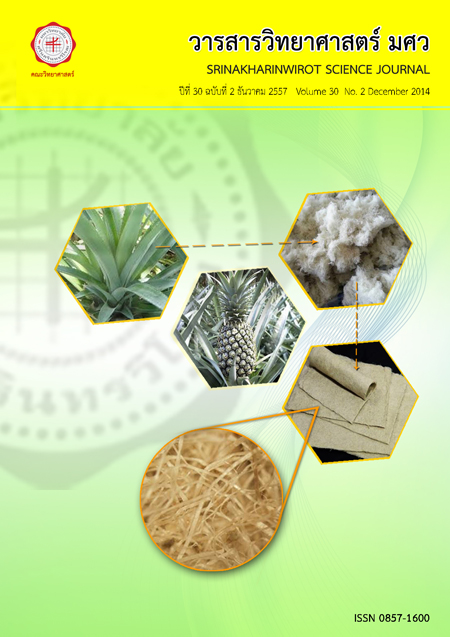สภาวะที่เหมาะสมต่อการผลิตเอนไซม์ย่อยสลายอะลิฟาติกพอลิเอสเทอร์จากเชื้อ Actinomadura sp. strain TF1 Optimization for Production of Aliphatic Polyester-Degrading Enzyme from Actinomadura sp. Strain TF1
Keywords:
Actinomadura sp. เอนไซม์ย่อยสลายพอลิเอสเทอร์ ไบโอพลาสติก พอลิบิวทิลีนซัคซิเนต พอลิบิวทิลีนซัคซิเนต-โค-อะดิเพท พอลิไฮดรอกซีบิวทิเรต พอลิแลกติกแอซิด polyester-degrading enzyme, bioplastic, poly(butylene succinate), poly(butylene succinate-cAbstract
แอคติโนมัยสีทชอบร้อน Actinomadura sp. สายพันธุ์ TF1 แยกจากดินคอมโพสต์ในประเทศไทยและมีความสามารถในการย่อยสลายพลาสติกชีวภาพ ได้แก่ พอลิแลกติกแอซิด (PLA) พอลิแอล-แลกติกแอซิด (PLLA) พอลิคาโปรแลคโตน (PCL) พอลิบิวทิลีนซัคซิเนต (PBS) พอลิบิวทิลีนซัคซิเนต-โค-อะดิเพท (PBSA) และพอลิไฮดรอกซีบิวทิเรต (PHB) เมื่อเพาะเลี้ยงบนจานอาหารแข็งพอลิเอสเทอร์ ที่อุณหภูมิ 45 องศาเซลเซียสเพื่อศึกษาลักษณะทางฟีโนไทป์และการวิเคราะห์ด้วยยีน 16S rDNA พบว่ามีความเหมือนกับเชื้อ Actinomadura miaoliensis (ความคล้ายคลึง 99 เปอร์เซ็นต์) PBS ถูกเลือกเป็นสับสเตรทเพื่อทดสอบการทำงานของเอนไซม์ PBS depolymerase จากสายพันธุ์ TF1 ทั้งรูปแบบการย่อยสลายในแผ่นฟิล์ม PBS (ความหนา 100 ไมโครเมตร) และแบบอิมัลซิฟายเออร์ PBS ในอาหารเหลว basal medium ผลการทดลองพบว่าแผ่นฟิล์ม PBS มีน้ำหนักแผ่นลดลง 60 เปอร์เซ็นต์หลังจากบ่มเป็นระยะเวลา 90 วัน และเมื่อศึกษาด้วยกล้องจุลทรรศน์อิเล็กตรอนแบบส่องกราดของแผ่นฟิล์มที่บ่มไว้เป็นระยะเวลา 30 วัน แสดงถึงการเปลี่ยนแปลงโครงสร้างบริเวณผิวหน้าฟิล์ม เช่น เกิดการกร่อนและเกิดรูเมื่อเปรียบเทียบกับแผ่นฟิล์ม PBS ที่ไม่ได้เติมเชื้อ การทำงานสูงสุดของเอนไซม์ PBS depolymerase เท่ากับ 21.8±1.96 ยูนิตต่อมิลลิลิตร อุณหภูมิและค่าความเป็นกรด-เบสที่เหมาะสมต่อการทำงานของเอนไซม์คือ 45 องศาเซลเซียส และ 7.0 ตามลำดับเมื่อใช้ PBS เป็นแหล่งคาร์บอนและสารสกัดจากยีสต์ร่วมกับแอมโมเนียซัลเฟตเป็นแหล่งไนโตรเจนสำหรับการเลี้ยงเชื้อ A thermophilic actinomycete, Actinomadura sp. strain TF1 was isolated from compost soil in Thailand and had the ability to degrade the biodegradable plastics such as poly(lactic acid) (PLA), poly(L-lactic acid) (PLLA), poly(e-caprolactone) (PCL), poly(butylenes succinate) (PBS), poly(butylenes succinate-co-adipate) (PBSA) and poly(b-hydroxybutyrate) (PHB) when cultured on polyester agar plates at 45ºC. According to phenotypic characteristics and 16S rDNA gene analysis was identified as Actinomadura miaoliensis (99% similarity). PBS was selected as substrate to demonstrate PBS depolymerase enzyme activity by strain TF1 both PBS film (thick 100 mm) and emulsified PBS in basal medium. The results showed that PBS film lost weight of 60% after 90 days and the scanning electron microscopy of film at 30 days of incubation showed many changes in surface structure, such as erosion and pit formation as compared to the untreated PBS film. The highest activity of PBS depolymerase was 21.8±1.96 U/ml. The optimum temperature and pH were 45 ºC and 7.0, respectively when using PBS as carbon source and yeast extract plus ammonium sulphate as nitrogen source for cultivation.Downloads
Download data is not yet available.
Downloads
Published
2014-12-24
How to Cite
ศรียาภัย ท., ศิริโภค ส., จันทร์ศิริ โ., เพ็ชรวัฒนา น., & สมยูรทรัพย์ พ. (2014). สภาวะที่เหมาะสมต่อการผลิตเอนไซม์ย่อยสลายอะลิฟาติกพอลิเอสเทอร์จากเชื้อ Actinomadura sp. strain TF1 Optimization for Production of Aliphatic Polyester-Degrading Enzyme from Actinomadura sp. Strain TF1. Science Essence Journal, 30(2). Retrieved from https://ejournals.swu.ac.th/index.php/sej/article/view/4881
Issue
Section
Research Article








